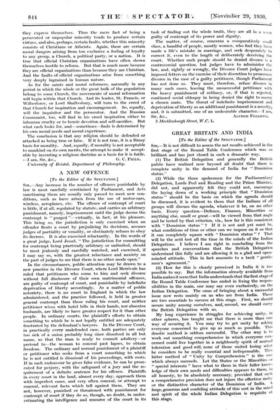A NEW OFFENCE
[To the Editor of the SPECTATOR.]
Sue,—Any increase in the number of offences punishable by law is most carefully scrutinized by Parliament, and Acts sanctioning them are usually only passed to meet new con- ditions, such as have arisen from the use of motor-cars, wireless, aeroplanes, etc. The offence of contempt of court is little, if at all, regulated by statute, and carries an arbitrary punishment, namely, imprisonment until the judge deems the contempt is "purged "—virtually, in fact, at his pleasure. This being so, the jurisdiction is only exercised when an offender flouts a court by prejudicing its decisions, accuses judges of partiality or venality, or obstinately refuses to obey its cletiocs. It is also exercised reluctantly. In the words of a great judge, Lord Jesse!, "The jurisdiction for committing for contempt being practically arbitrary or unlimited, should be most jealously and carefully watched, and exercised, if I may say so, with the greatest reluctance and anxiety on the part of judges to see that there is no other mode open."
In the circumstances, public attention may be drawn to a new practice in the Divorce Court, where Lord Merrivale has ruled that petitioners who come to him and seek divorce without full disclosure of their own matrimonial offences, are guilty of contempt of court, and punishable by indefinite deprivation of liberty accordingly. As a matter of public notoriety, there is no court in England in which the law administered, and the practice followed, is held in greater general contempt than those ruling his court, and neither petitioner wives with hotel bills in their hands, nor absentee husbands, are likely to have greater respect for it than other people. In ordinary courts, the plaintiff's efforts to obtain something to which he is not legally entitled are adequately frustrated by the defendant's lawyers. In the Divorce Court, in practically every undefended case, both parties are only too sick of a union probably long since dissolved in all but name, so that the man is ready to commit adultery—or pretend to—the woman to conceal past lapses, to obtain freedom. The ordinary and normal punishment of a plaintiff or petitioner who seeks from a court something to which he is not entitled is dismissal of his proceedings, with costs. If in such endeavour he gives false evidence, he can be prose- cuted for perjury, with the safeguard of a jury and the re- quirement of a definite sentence for his offence. Plaintiffs in every court in the land, almost every day, approach them
with imperfect cases, and very often conceal, or attempt to conceal, relevant facts which tell against them. They are not, however, punished or threatened with punishment for contempt of court if they do so, though, no doubt, in under- estimating the intelligence and resource of the court in its task of finding out the whole truth, they are all in a srase guilty of contempt of its power and dignity.
The matter, of course, concerns a comparatively small class, a handful of people, mostly women, who find they have made a life's mistake in marriage, and seek desperately to correct it, even to the length of deliberately deceiving the court. Whether such people should be denied divorce is a controversial question, but judges have to administer the law, and, rightly or wrongly, the Divorce Court judges have imposed fetters on the exercise of their discretion to pronounce divorce in the case of a guilty petitioner, though Parliament has not done so. They must, therefore, refuse divorce in many such eases, leaving the unsuccessful petitioner with the heavy punishment of celibacy, or, if that is rejected, continued social obloquy in being denied the right to marry a chosen mate. The threat of indefinite imprisonment and deprivation of liberty as an additional punishment is a novelty, and, it is submitted, one of an undesirable character.—!










































 Previous page
Previous page